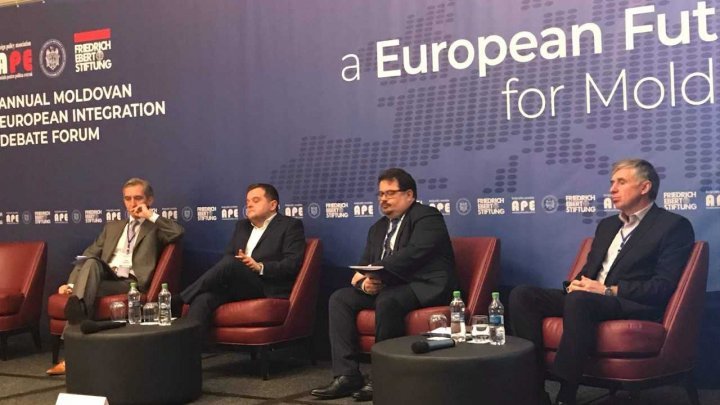Iurie Leanca: Only by intensifying dialogue with EU we can improve situation in some areas of Moldova
 foto: gov.md
foto: gov.md
Deputy - Minister Iurie Leanca participated Tuesday, November 20th, at the annual Forum for Debate on European Integration of Moldova organized by the Foreign Policy Association of Moldova (APE) and Friedrich-Ebert-Stiftung Moldova (FES), in partnership with the Ministry of External and European Integration (MFAEI).
The Deputy Prime Minister, together with the Head of the European Union Delegation, Peter Michalko, Romanian State Secretary Tudor Buzatu and EPP Co-founder Ion Sturza discussed the major challenges to the EU-Moldova relations and the impediments that our country faces in the implementation of reforms under the Association Agreement.
According to the Moldovan official, although Moldovan-EU relations are going through a more complicated phase, our country is making progress in the economic and financial-banking reforms and the authorities are still making considerable efforts to fulfill their commitments to the EU.
"Talks with decision-makers from major European family members make me relatively optimitic about the prospects for Moldovan-EU relations. Compared to Ukraine and Georgia, the Republic of Moldova is considered by many European politicians a country that is more likely to become a member of the European Union, including because half of our citizens are also European citizens", said Iurie Leanca.
At the same time, the Deputy Prime Minister mentioned that only the intensification of the dialogue between the Republic of Moldova and the European Union will allow to overcome the problems in certain fields, especially those in the field of justice.
"In order to accelerate justice reform, we must intensify dialogue and interactions at all levels with European partners", said the official.
This year, the Debate Forum on European Integration of the Republic of Moldova is at its sixth edition and brought together decision-makers from the Republic of Moldova and the EU, opinion makers, representatives of political parties, civil society and international organizations and media.